Posts Tagged ‘Chicagoland’
World Relief Praises the Re-Introduction of the Bipartisan Afghan Adjustment Act and Urges Swift Passage
July 14, 2023
CONTACT:
Pinkston Team
wr@pinkston.co
BALTIMORE, MD — Today, World Relief praises the bipartisan re-introduction of an Afghan Adjustment Act in both the U.S. Senate and the U.S. House of Representatives and urges swift Congressional passage of the bill.
This important bill acknowledges the plight of Afghan nationals who faced an urgent threat of persecution under the Taliban, including many who have worked tirelessly alongside the United States military, diplomatic missions, and non-governmental organizations, risking their lives to support the cause of peace and stability. These individuals have been our allies and partners in promoting shared values such as freedom, justice, and human dignity. We are grateful that they have found refuge in the United States – but they still have only temporary legal protections in the U.S. that bear expiration dates.
“In the nearly two years that have passed since Afghanistan fell to the Taliban, World Relief has partnered with churches and communities to serve more than 6,000 Afghans who fled persecution,” said Myal Greene, president and CEO of World Relief. “Americans of all backgrounds have eagerly welcomed Afghan neighbors. The Afghan Adjustment Act is an opportunity for Congress to convey the American public’s commitment to Afghan parolees by allowing them to apply for permanent legal status, relieving them of the fear and stress associated with living in legal limbo.”
Over 70,000 Afghans were evacuated to the U.S. in the weeks following the fall of Kabul nearly two years ago. The need to support their full integration continues, as many Afghans remain in legal limbo, with their parole and work authorization bearing expiration dates. The Afghan Adjustment Act would allow Afghans with parole to apply for Lawful Permanent Resident status without needing to rely upon woefully backlogged legal processes for asylum or Special Immigrant Visas. The bill also appropriately subjects Afghans to additional vetting and screening before they would be granted permanent legal status.
“We are grateful for the strong bipartisan leadership in the U.S. Senate and House of Representatives, demonstrating that Congress works together on common sense policy solutions,” said Matthew Soerens, Vice President of Advocacy & Policy for World Relief. “We urge Congress to act immediately to pass it into law, heeding the voices of Afghan allies and of the many people who have helped to welcome new Afghan neighbors, including thousands of local churches that have stepped up to build communities of love and welcome to receive them.”
World Relief invites all who care about the wellbeing of Afghans to urge their Members of Congress to support the Afghan Adjustment Act. An online tool to do so is available at https://worldrelief.org/advocate/support-the-afghan-adjustment-act/.
To download a PDF version of this release, click here.
###
About World Relief
World Relief is a global Christian humanitarian organization whose mission is to empower the local church to serve the most vulnerable. The organization was founded in the aftermath of World War II to respond to the urgent humanitarian needs of war-torn Europe. Since then, for over 75 years, across 100 countries, World Relief has partnered with local churches and communities to develop sustainable, locally-driven solutions to some of the world’s greatest problems. To learn more, visit worldrelief.org.
Experiencing God’s Generosity Through the Hands of Others
Before long, students will soon be ready to go back to school! This includes refugee and immigrant families, and you and I have a great opportunity if we open our hearts in support. Reflecting on this mid-summer season, I want to share a story from my own family about how God takes care of those who trust Him.
The Heart of God
I was born in the Soviet Union in a large Christian family. We lived in a society that was aggressively opposed to faith in God. Atheism was the main religion, and the state did everything possible to make life difficult for Christians. Our life was not easy. My own school experience as a child was not always positive. But my parents raised us to trust God in many different circumstances and to always pray and trust God every day. This is how we survived the Soviet Union and the economic crisis that came after it collapsed.
In 1998 my family and I received an invitation to move to the United States under the religious refugee program, but we could not even pay for the tickets. Then World Relief supported us, and in the end people who did not even know us responded and donated so we were able to move to this country!
First Kings 17:9 says “Get up and go to Zarephath of Sidon and stay there. I ordered a widow woman there to feed you.” This verse reminds me that when you trust God, you see how he has his own people all over the world who can care for you and give what is needed.
Who knows, maybe today you are the person God can use to help another, just as strangers helped my family years ago!
“Get up and go to Zarephath of Sidon and stay there. I ordered a widow woman there to feed you.”
1 Kings 17:9
Even the smallest things help! You can help by donating backpacks, school supplies, and other seasonal needs today!
Image: Tanya, her husband Oleg, and her daughter Lisa on their flight to the USA in 1999.
The Power of Perspective in Relationships
Every relationship you have holds the potential to change you. And when you grow your perspective to understand the experiences, thoughts, and values of others, those relationships hold the power to help change a community.
I’ve had many relationships throughout the years that have guided, challenged, encouraged, and shaped my life. And I’m sure you could list the names of several people who did the same for you. But it was one relationship that significantly impacted the trajectory of my life because it opened my understanding of the world and the people in it.
During high school, I was blessed to meet another young woman my age, an exchange student from Croatia. We got to know each other and became friends. One day I learned that her living situation was falling apart. She faced the blunt reality of being forced to move to another town and start over. Because our friendship had become an important part of my life, I felt compelled to do something. I proposed the idea to my parents that my friend move in with us.
I would like to think it was my persuasive skills that made them say yes. Rather, their openness was rooted in their love for God and for others – core tenants of our Christian faith. They welcomed her with open arms. Before long, I was sharing the master bedroom with my new friend who truly became like a sister to me for the rest of that school year.
“When your perspective is given the space to grow, it has the power to change you.”
We became friends for the same reasons most friendships begin: sharing interests and spending time together. We didn’t enter into a friendship with the intention that we would grow or change from it. But through the ebb and flow of our shared experiences, it naturally became mutually transformative.
Our friendship helped me become more of the person God invited me to be. She grew my perspective – and by doing so, I began to change into someone who values differences and wants to welcome others. My understanding that we are all beautifully made in the image of God, brimming with life and potential, continues to inspire me to this day in the work God has called me to do.
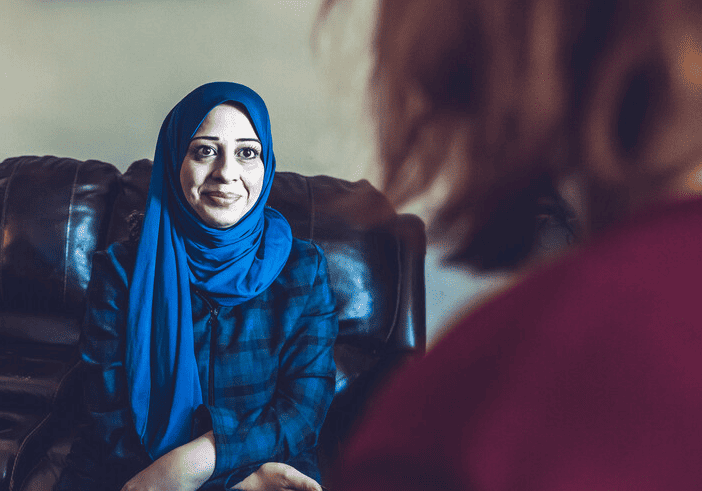
“Your perspective grows in the context of relationship and by your proximity to the stories of others.”
In my role at World Relief, I regularly get to listen to and learn from our refugee and immigrant neighbors. As we celebrate Refugee Awareness Month and World Refugee Day on June 20th, two World Relief staff members who came to the United States as refugees offered to briefly share their experiences. I believe listening to their stories – and other refugees’ stories like them – helps to broaden our perspective on the true impact that occurs when we choose to walk alongside our refugee neighbors as they rebuild their lives.
I celebrate these friends and the thousands of other refugees who have found themselves rebuilding a life in the wake of tragedy.
Every year millions of people are forced to leave their homes for hundreds of reasons and become refugees. Whether they’ve been persecuted because of their faith, their nationality, their gender or sexuality, or experienced extreme poverty or political oppression, they still bear the image of God. In spite of the story playing out in their lives at that particular time, their worth remains. We get to become a part of that story as they rebuild their lives in the U.S., and in so doing, discover how the image of God is alive in us as well.
“Your perspective grows when it becomes intentional.”
As I look back on my high school years, I’m so grateful for my parents’ willingness to listen to my friend’s story. They stepped out in faith and moved closer to her, choosing to do something they hadn’t done before by giving her a place in our home.
Their decision reflected an important truth about growing your perspective to build mutually transformative relationships. It takes intention to move out of your comfort zone into spaces where people are different from you. It’s in these spaces where you grow, learn, and transform. Yes, it can happen by accident, but it almost always requires a deliberate effort.
During this Refugee Awareness Month, let’s be people who are intentional. Let’s be people who celebrate our refugee neighbors. And let’s be people who celebrate and welcome those around us the way that God celebrates and welcomes us.
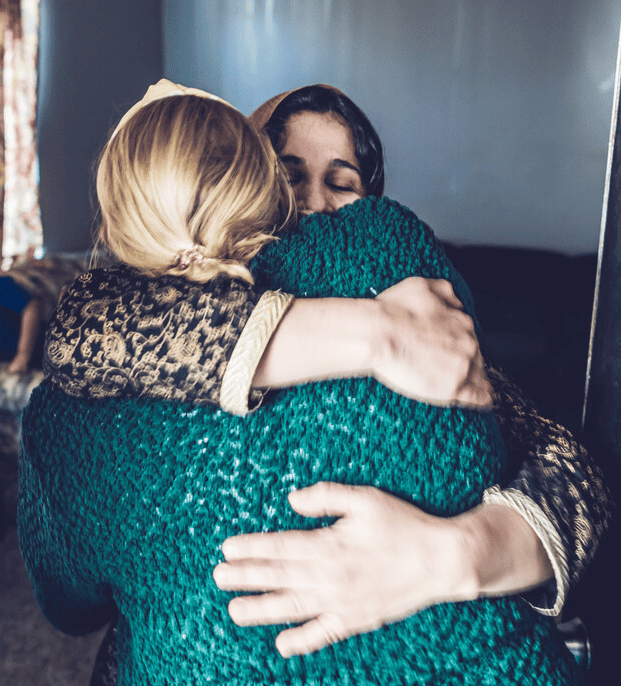
The Part You Play
By the end of September, World Relief Chicagoland expects to resettle over 400 refugees from all over the world and people like you have a part to play every step of the way. Through volunteering, donating needed items, or giving financially you can be a part of something greater, a truly welcoming community. To learn more about how to show welcome and celebrate Refugee Awareness Month, visit World Refugee Day 2023 – World Relief
World Relief Applauds Bipartisan Introduction of the Dignity Act
May 23, 2023
CONTACT:
Pinkston Team
wr@pinkston.co
Today, a bipartisan group of congressional leaders led by Rep. Maria Elvira Salazar (R-FL) and Rep. Veronica Escobar (D-TX) introduced the Dignity Act – a broad immigration reform bill that would include an earned path to legal status for qualifying undocumented immigrants with the option to pursue naturalization, an expedited path to citizenship for Dreamers, and reforms to border security and asylum processing.
World Relief celebrates the introduction of this bipartisan bill. As will be the case in any carefully-negotiated consensus legislation, we may have concerns with some elements of the bill, but we are encouraged by this good-faith, bipartisan process that includes many of World Relief’s longstanding immigration policy priorities.
“Legislative reforms to the entire U.S. immigration system are long overdue, but the only path toward broad, durable reforms is through bipartisan cooperation. I’m thankful to Rep. Salazar, Rep. Escobar and the other original cosponsors of this bill for doing the hard work of forging consensus across the partisan lines that for decades have stymied real reforms from passing into law,” said Myal Greene, president and CEO of World Relief. “Consistent with the biblical conviction that all human beings are made in the image of God with inherent dignity and potential, the Dignity Act would allow undocumented immigrants to earn permanent legal status and eventual citizenship if they pay a fine and meet other requirements. I pray that both Republicans and Democrats in Congress will come to the negotiation table to finally realize reforms that both secure our borders and show compassion to immigrants.”
The bill stands in contrast to a partisan bill that narrowly passed the U.S. House of Representatives earlier this month, H.R. 2, which would dramatically roll back existing legal protections for asylum seekers and for unaccompanied children in ways that World Relief believes are morally unacceptable. But unlike a partisan bill that has no chance of being signed into law in the current Congress, the bipartisan Dignity Act addresses the policy priorities of both Republicans and Democrats. We urge members of Congress in both parties to take this bill as a starting point for further negotiation, and urge the Biden administration to play a constructive role in convening good-faith negotiations as well.
As a global Christian humanitarian organization with a long history of partnering with evangelical churches to welcome immigrants to the U.S., World Relief encourages Christians to use their voices to advocate for long-overdue immigration reforms. A study by Lifeway Research last year found that 78% of American evangelicals support proposals that “would both increase border security measures and establish a process so that those immigrants in the U.S. unlawfully could earn permanent legal status and eventually apply for citizenship if they pay a fine, pass a criminal background check, and complete other requirements
during a probationary period.” That represents a 12% increase since 2015. Notably, only 15% of American evangelicals would oppose such a proposal.
“We’ve advocated, mobilized local churches and prayed for many years for many of the policies included within this bill,” observed Matthew Soerens, Vice President of Advocacy and Policy for World Relief. “We’re not naive to the political challenges ahead in forging consensus in a time of deep partisan divides, but we also believe in a God for whom nothing is impossible. We’re both praying and mobilizing for the day when a broad, bipartisan reform, including an earned pathway to citizenship for undocumented immigrants, is signed into law.”
To learn more about World Relief’s programs around the world, visit worldrelief.org.
About World Relief
World Relief is a global Christian humanitarian organization that brings sustainable solutions to the world’s greatest problems – disasters, extreme poverty, violence, oppression, and mass displacement. For over 75 years, we’ve partnered with churches and community leaders in the U.S. and abroad to bring hope, healing and transformation to the most vulnerable.
Learn more at worldrelief.org.
To download a PDF version of this press release, click here.
###
About World Relief
World Relief is a global Christian humanitarian organization whose mission is to empower the local church to serve the most vulnerable. The organization was founded in the aftermath of World War II to respond to the urgent humanitarian needs of war-torn Europe. Since then, for over 75 years, across 100 countries, World Relief has partnered with local churches and communities to develop sustainable, locally-driven solutions to some of the world’s greatest problems. To learn more, visit worldrelief.org.
Building a Summer of Welcome
Summer is right around the corner! It’s the season of graduation parties, life transitions, and changing ministry rhythms. In the midst of all that, my team has been wondering, How can your church keep serving and welcoming our immigrant and refugee neighbors through the summer season – and have some fun along the way?
Here’s one creative example. Recently a Ukrainian colleague and her niece spent time with a group of high schoolers to share about their life experiences. The students were so stirred by hearing from a peer about the realities of displacement and adaptation to a new country that they self-organized and collected $2,000 to supply newly arriving families with welcome kits – sets of donated items that furnish homes for new families.
Their ingenuity was totally unexpected and blew us away! However, as our offices continue receiving over 80 people a month for refugee resettlement, the needs continue.
Summer is a time to slow down a little and invite your church to embrace the joy and fun activities of the summer. With some creativity and cheerful hearts, how could your church think of new ways to collect Welcome Kits?
Perhaps you could …
- Challenge your youth group to hold a scavenger hunt at Walmart to collect all the items for a Welcome Kit in record time.
- Send off your small groups to see who can find the most discounted kitchen item at Bed, Bath, and Beyond before it closes!
- Invite your tech savvy college students and their friends to build a Welcome Kit item by item from their computers or phones by using the Welcome Kit Amazon wishlist.
Like the students at this high school did, I’m sure you can think of your own ideas to engage your congregation!
If you’d like to learn more, sign up here and someone from our team will reach out with details. You can also view our Welcome Kit guide here. We can’t wait to see what ideas you come up with as you continue building communities of welcome and love with our immigrant and refugee neighbors this summer!
When It Comes to Impact, Small Things Live Large
When challenges arise, it’s easy to overlook the small things that can bring meaning and ultimately joy to any situation. In fact, it’s often in these small things where the true impact lies, giving us a fuller picture of what really matters.
Listen to three World Relief Chicagoland staff share stories of how these small but impactful events brought about a sense of belonging, growth and resiliency in the lives they touched.
Holly’s Story: A Simple Invitation
A lot of preparation and detail goes into welcoming new refugee families and individuals when they first arrive in the Chicagoland area. But this past March proved to be particularly challenging. World Relief Chicagoland saw its highest number of refugee arrivals in the last six years.
Trying to keep pace with this activity, there were days Volunteer Director Holly felt burnt out and exhausted. And it got discouraging when plans fell through – such as a family’s last-minute travel cancellation.
But Holly finds meaning, encouragement, and a renewed vision from the testimonies she receives from volunteers who walk alongside her. Here, she shares an encouraging reminder from one volunteer transportation assistant after he picked up a newly-arriving family from the airport.
Marlina’s Story: The Mini-Celebration
Walking alongside Good Neighbor Teams as they grow from the high and low points of their experience always encourages Volunteer Teams Specialist Marlina. One of these moments came from a gentleman who was excited about leading a team from his church – eager to connect with a refugee family who moved into the neighborhood.
Yet upon building a relationship with the family, his frustration grew when he realized the many barriers they were up against – and there was nothing he could do to fix them.
But he learned there was one thing he and his team could do for this family: recognize the small things worthy of celebration. Marlina highlights one important celebration that left an impact on the group.
Ashley’s Story: A Resilient Advocate
After fleeing Ukraine with her family, Tania* found herself in the class of ESL Instructor Ashley, determined to learn a new language and adjust to a new culture. But it was easy to feel overwhelmed and intimidated by her new situation.
After the class resumed from the holiday break, Tania returned and shared a terrible situation that happened while she was away. Her son had broken his arm.
Yet when Tania told her story, the class noticed something different in her demeanor. She was confident and her words were filled with joy. Tania accomplished something much sooner than she thought possible. She advocated for her son by navigating a complex healthcare system with her own English words.
Ashley shares Tania’s story of resilience when pushed to become an advocate for her family.
*Name changed for privacy.
Make an Impact. Get Involved.
There’s no small part at World Relief Chicagoland. Whether you serve as a transportation assistant, Good Neighbor Team member, or ESL tutor, the “small” things will continue to live large in the lives you impact as a volunteer.
Read more about the impact you can make as a volunteer:
How to Have Impact as a Volunteer Tutor
Social Emotional Learning Equips Refugee Children and Their Families to Thrive
At World Relief, we are committed to advocating for refugees the opportunity to legally seek refuge in the United States. But our work doesn’t end there. We know that serving the refugee community requires caring for the whole person and their families.
As part of our bold vision to move Forward Together, we are determined to Go Deeper in our care for our refugee and other immigrant neighbors by addressing root causes of vulnerability and expanding our expertise in mental health.
Carrie Woodward, Foundations Partnerships Manager for World Relief Chicagoland, breaks down one of the trauma-informed mental health strategies: Social Emotional Learning.
At just four years old, Sam arrived in the United States with his family. Upon arrival, they were welcomed by World Relief Chicagoland. Like other refugees, the family arrived with hope and dreams for their future. the chance to rebuild in the United States did not erase the impact left by tragedy and trauma — even for a young child like Sam.
Refugee children carry their complex emotions and traumatic histories with them. This can make getting to a place of stability and happiness very challenging.
Even after coming to the U.S. Sam’s body and mind were marked by the trauma of his past, and he struggled to adjust. He had a lot of emotions that he did not understand or know how to express – so he lashed out in frustration. This left his parents feeling exhausted and overwhelmed, unsure of what to do. His mother told World Relief, “I feel helpless.”
The Challenges Refugee Children and Youth Face
For children, whose brains are still developing, the resettlement experience itself can be retraumatizing as they encounter language barriers, difficulty navigating community resources, lack of relational support and culture shock. Many refugees come from cultures where discussing mental health is taboo. This often means that busy parents like Sam’s who are processing their own trauma may not know how to support their children in recovering too.
Thankfully, with the help of community partners and volunteers, World Relief Chicagoland is equipping parents and children to grow and thrive through Social Emotional Learning (SEL).
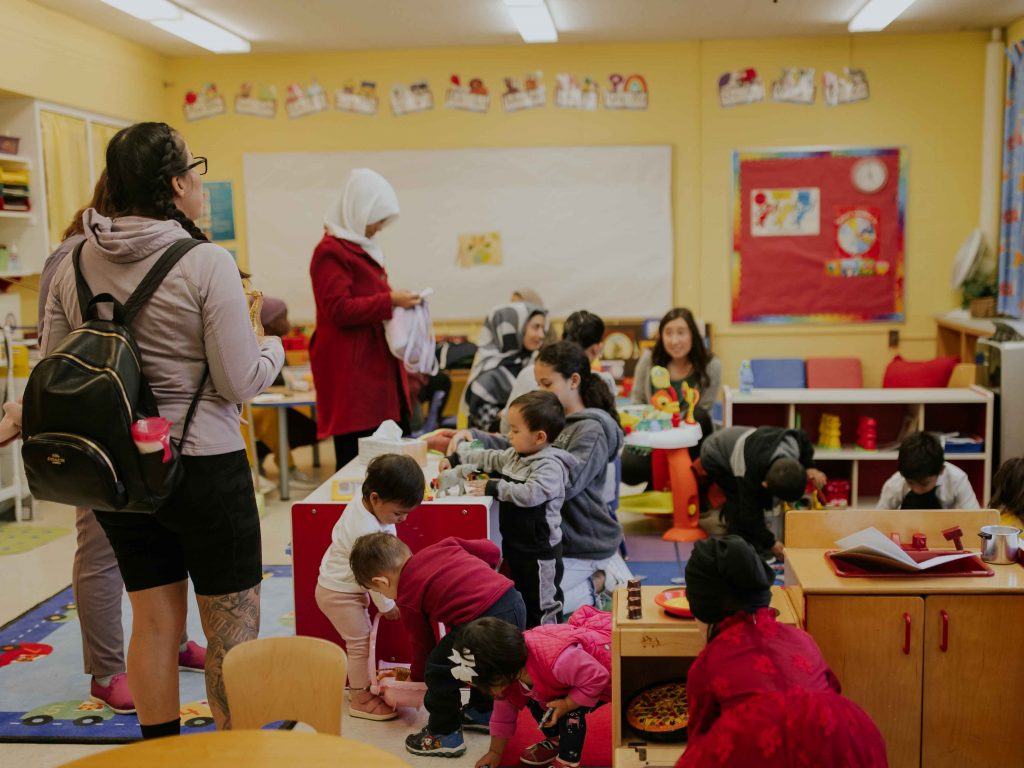
How Social Emotional Learning Changes Children’s Lives
Refugee children have often experienced chronic stress for months or even years at a time. Their stories are often marked with violence, poverty, death of loved ones and displacement. These factors create complex thoughts and feelings that can feel scary to explore. Yet, processing these emotions is key to moving forward.
Social Emotional Learning helps children process by focusing on five areas that impact every aspect of life: self-awareness, self-management, responsible decision-making, relationship skills, and social awareness.
Each of these areas impacts a child’s self-confidence, relationships and ability to cope with daily stressors. Research has shown that when compared to students who did not participate in SEL, those who engaged with SEL activities:
- Had better grades
- Showed more skills for managing anxiety and depression
- Behaved better in a classroom setting
- Expressed better attitudes towards themselves and others
These impacts have long-term, positive effects. One analysis showed that students who participated in SEL programs gained social emotional skills that led to higher levels of well-being 18 years later.
What Does SEL Look Like At World Relief?
World Relief Chicagoland incorporates SEL into age-appropriate activities such as:
- 10-minute guided check-ins to identify and reflect on how their bodies are feeling
- Writing, drawing, or speaking “I am” statements. Saying affirmations like “I am good at basketball!” or “I am a great big sister!” can build self-confidence
- Using a chart of expressive emojis to help preschoolers identify and describe feelings
- Coloring pictures in response to prompts like “Show us your family” or “Show your home
SEL is part of a holistic approach to mental health that addresses the specific emotional needs of immigrant and refugee youth.
“Equipping refugee children with the tools and treatment they need to adapt and grow through trauma forges a pathway for them to embrace emotion and learn how to process it in a way that feels safe and organic to their developmental level,” said Katie Schnizlein, Early Childhood Program Coordinator at World Relief Chicagoland. “This breaks down the barriers of layered emotion and devastating trauma…as they grow into the rest of life.”
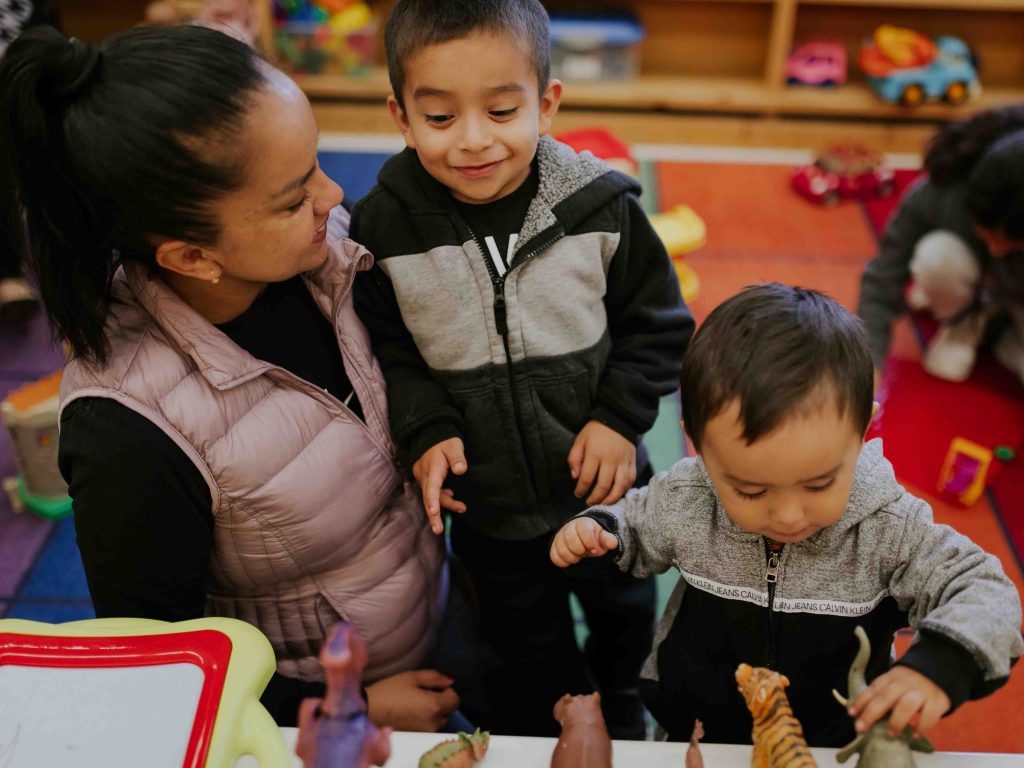
Preparing Children for Life
Ultimately, Katie says, “SEL ensures that children have services that cover mind, body and soul. Through SEL, children have the ability to grow in agency, autonomy, self-awareness, emotional regulation and the art of fitting into the world around them.”
In Sam’s case, SEL is part of the answer to the pain and the helplessness his parents felt.
Shortly after they arrived, Sam started attending a preschool and participating in World Relief’s Children & Youth program. He gained structure and relational support through his tutor and SEL activities, while his mother joined a World Relief-facilitated parenting group where she learned strategies to support her son socially and emotionally.
Thanks to this support system, now at five years old, Sam plays well with friends, is learning quickly in school and is working on naming and describing his emotions.
Make a Difference. Get Involved.
Volunteers in our Children and Youth program play an essential role in providing the relational and educational support refugee children need as they rebuild their lives. As an early childhood volunteer, youth tutor, or a summer club group leader, you can help make a difference.
Read more about the impact happening among children and youth:
How to Have Impact as a Volunteer Tutor
Summer Camp: Fun, Fellowship and First Responders
How Refugee Children Reshape Resettlement for Their Families

Carrie Woodward joined World Relief in 2021 in a role that engages foundation and business partners throughout the Chicago area. She studied community development and history at Covenant College. Her education informs her passion for asking questions and a desire to find evidence-based ways to help communities flourish. Prior to coming to World Relief, Carrie worked for an international development organization and an academic research lab in Arizona. She is an avid reader, podcast-listener and loves exploring Chicago’s many unique neighborhoods, playing pickleball and walking by Lake Michigan.
Building a Cross-Cultural Relationship as a Volunteer
Whether you’re a seasoned volunteer or just starting out, Whitney Renfroe agrees that uncertainty can often accompany a cross-cultural relationship. After all, Whitney is no stranger to helping immigrants.
During her college years, this occupational therapist spent a summer month in Greece serving and walking alongside refugees. And it’s the passion that brought her to the Chicagoland area. Being closer to a larger immigrant population meant more opportunities to build meaningful relationships.
As Whitney shares about her friendship with Afghan Paralympian, Farzana, she addresses several uncertainties that often crop up as a cross-cultural volunteer. Following are a few insights to help you get past some of your own doubts and move you closer to building a relationship that can change your life.
God will use you exactly where he needs you. Even if it takes you a little longer to get there.
A simple invitation over a cup of coffee brought Whitney to World Relief Chicagoland in August 2021. Her meeting with an acquaintance who belonged to a church that was a World Relief partner opened her eyes to a new opportunity. They needed volunteers to walk alongside Afghan refugees arriving in the United States.
Whitney logged on to the application, eager to get started. But instead of volunteering, she found herself waiting.
Good timing has a reason.
Coming off the cusp of the Covid shutdown, many non-profit organizations were navigating the sudden broad changes in society – and World Relief Chicagoland was no exception. Volunteer opportunities came Whitney’s way, like setting up an apartment, but the timing didn’t work with her schedule.
As weeks passed by with still no fit, Whitney remained patient but held some doubts. Was this going to happen? Then came the call from World Relief about a role she hadn’t heard of.
“They were pretty open like ‘We recognize you’ve been waiting a really long time to be matched with someone. And we’re sorry it’s been so wild. But we’re wondering if you’d be interested specifically in being a health advocate?’”
A new individual had arrived at the Chicago office. A single Afghan woman who was close to Whitney’s age had a disability that required an extra level of healthcare support. With Whitney’s medical background to help navigate the American healthcare system, Farzana and Whitney were a perfect fit.
Whitney was impressed by the degree of thoughtfulness that World Relief had put into selecting her partner. “They didn’t want it to be just a random, ‘Let’s throw these people together.’ When I realized that, it made me appreciate the amount of time.”
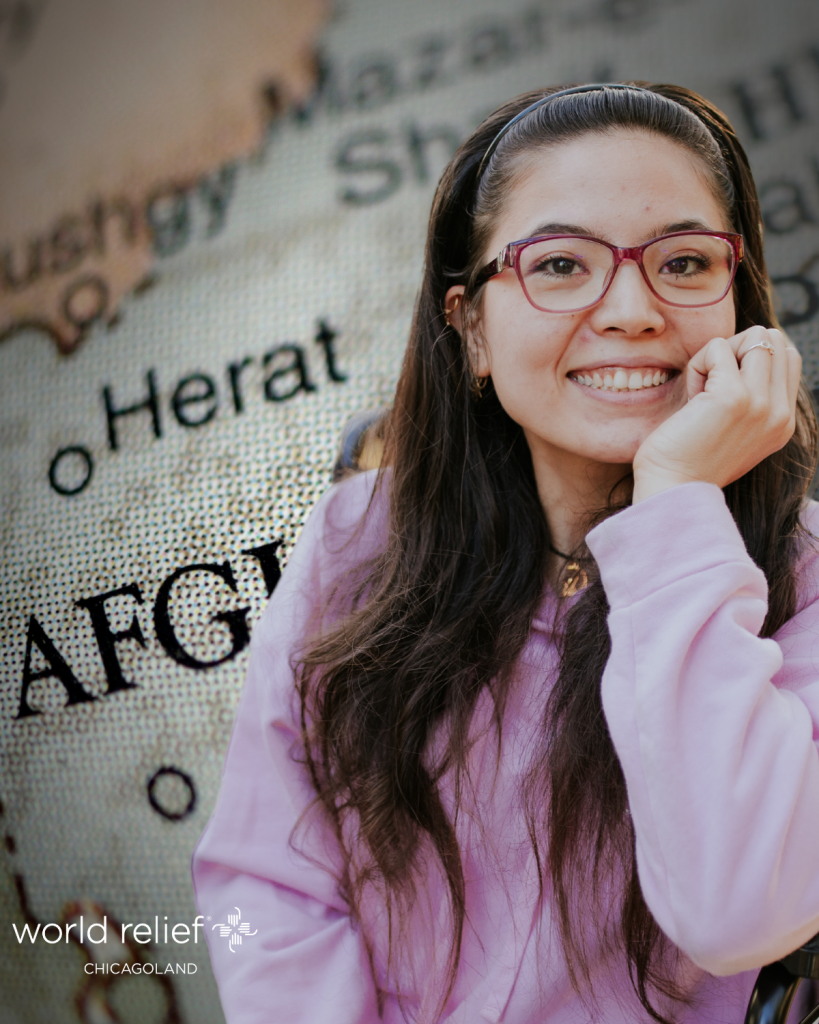
Don’t hold onto assumptions. Someone will always turn them upside down.
“She has taught me a lot about not assuming. Farzana is one of the most go-getting women I’ve ever met in my life.”
Whitney Renfroe
Whitney recognizes how easy it is in our Western culture to draw conclusions or build stereotypes about other cultures based on what’s portrayed in various news and media outlets. But when you take the time to get to know someone, it’s amazing how these portrayals are quickly shattered.
And being a volunteer enables you to experience it.
As Whitney grew closer to Farzana, she found an incredibly educated, resilient, and independent woman who for all practical purposes amplified the American dream. Farzana eagerly grabbed hold of every opportunity given to her. She went from speaking little English to growing exponentially in her usage of it. She began working a job and attending school. And she continued to pursue her passion by getting back onto the basketball courts.
In fact, the nature of their relationship wasn’t exactly how Whitney envisioned it either.
Whitney’s plan was to be a valuable resource for Farzana. Although she took Farzana to her doctor appointments and helped out where needed, much of their time was spent in a different way. “The majority of the time I think was honestly Farzana showing hospitality to me.”
When Whitney came to visit, Farzana was intentional about making her a cup of coffee and spending their time together talking and practicing English. To Farzana, this is where the value lay.
The small things carry weight. Sometimes more than the bigger ones.
Time and location didn’t always make it convenient for Whitney and Farzana to meet regularly. And often it’s this concern that can prevent someone from taking on the role of a friendship partner, health advocate, or youth tutor.
But when they couldn’t meet, Whitney found a number of other things that were just as meaningful. Weekly check-ins were made using WhatsApp, voice messages, or video calls to see how Farzana was doing and to let her know, “Hey . . . I was thinking about you.”
“I think those weekly quick check-ins were really important. It was something small and it didn’t always feel sufficient to me. But that doesn’t mean that there wasn’t a connection made even in those things.”
And with World Relief’s staff partnering with her, Whitney understood she was one piece of a bigger puzzle to help Farzana rebuild her life. “That took a lot of pressure off of me in terms of not feeling like I had to carry the weight of the whole thing. My job was to show up and to be there – to be a resource.”
Addressing the Awkwardness
What about the awkwardness that often accompanies the language barrier in cross-cultural relationships?
Whitney assures others it’s okay to feel awkward. In fact, count on feeling awkward because it will happen. But given what it took for that person to get here, “The least I can do is meet them in the awkward.”
In the meantime, as Farzana learned English, Whitney fell back on nonverbal communication and other small expressions. “You can make a connection without even having words, too. People appreciate a smile, kind gestures like little gifts.”
Sometimes it’s about letting whatever needs to happen in that space, happen.
Being the Bridge
Ultimately, Whitney believes that what it takes to build a cross-cultural relationship is what she strives to be for Farzana. A friend who serves as a bridge between two cultures.
“I would say the reality is, a lot of people come to this country and wonder, ‘Am I going to be accepted? Am I going to make friends? Am I ever going to learn English?’ I think having someone who regularly shows up . . . and just be a kind presence goes a really long way.”
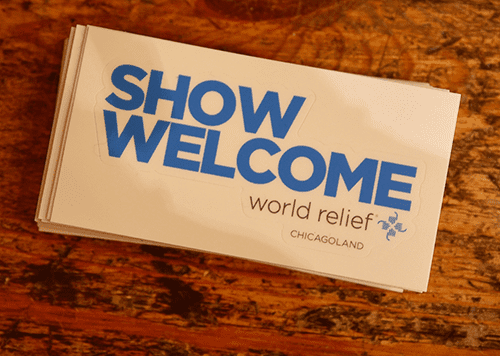
With a higher number of immigrants and refugees arriving in the United States, World Relief Chicagoland needs more volunteers to walk alongside them. Unfortunately, for nonprofits across the nation, volunteering rates have been decreasing. You can be part of the solution — whether it’s becoming a friendship partner, tutoring a young student, or driving someone to a job orientation — there’s a volunteer opportunity to fit your interests and lifestyle. Find the part you play today!
Where can you serve as a volunteer this summer?
Become a Youth Tutor: Read How to Have Impact as a Volunteer Tutor
Serve in a Youth Club or Summer Camp: Read Summer Camp: Fun, Fellowship and First Responders
World Relief Argues Detaining Children Should Stay Off the Table
March 17, 2023
CONTACT:
Pinkston Team
wr@pinkston.co
Baltimore, MD – World Relief is troubled by recent reports indicating that the Biden administration is considering the reinstatement of migrant detention policies utilized by previous administrations. Restoring these policies would allow the government to temporarily hold immigrant families – including young children – in jail-like facilities upon their arrival to the United States while they await a court hearing. As a Christian humanitarian organization, we remain steadfast in our opposition to inhumane policies that harm children, separate families, and create additional hardship for those fleeing violence and persecution.
“Families who have endured a dangerous journey to the U.S. border in order to seek asylum, seeking to avail themselves of protections offered under U.S. law to those who can demonstrate a credible fear of persecution, should not be held in jail-like detention facilities. Frankly, children never belong in such conditions,” said Aerlande Wontamo, Senior Vice President of US Programs at World Relief. “As Christians who believe each of these children and their parents are made in God’s image with inherent dignity, we hope and pray that reports that the Biden administration is considering reviving this process are inaccurate or at least that the broad opposition to such policies leads them to ultimately reject policies that would revive the practice of detaining children.”
World Relief calls on President Biden to fulfill his promise to “secure our border, while ensuring the dignity of migrants and upholding their legal right to seek asylum” by rejecting family detention policies and, instead, investing in more cost-efficient and humane alternatives.
“Among the many policy changes needed to ensure a more orderly asylum system and a more secure border, one change that the Biden administration ought not to consider is a revival of the unjust practice of detaining children in jail-like facilities. While not every family that arrives at the U.S.-Mexico border will qualify for asylum, it’s vital that each is afforded due process to present their case and that we treat everyone – and especially children, given their unique vulnerabilities – humanely,” said Matthew Soerens, Vice President of Policy & Advocacy at World Relief. “There is ample evidence that families who are placed into alternative detention programs will show up for their immigration court hearings in the vast majority of cases, and while we need Congress to invest in significantly increasing asylum adjudication capacity and legal representation for asylum-seeking families, detaining children while they wait for hearings should be off the table.”
To download a PDF version of this press release, click here.
The Act of Sacrificial Love
This month, about 100 people will arrive as refugees at our offices in Chicagoland from countries like Afghanistan, Syria, Burma and others. As we prepare for Holy Week, I can’t help but reflect on God’s lavish and magnificent love for each of these individuals and the opportunity we have to show sacrificial love.
I was also reminded of the way God loves all of us in our vulnerability through a terrifying event involving my son while on vacation recently. Our tour guide took us to a dramatic cliff overlooking the ocean. Within seconds we noticed our 9-year-old son running down the stairs towards the water. We tried to stop him, but no success. The next thing I remember was him being swept away by the vicious, towering waves.
Even though I can’t swim, I immediately ran and jumped into the water. I also ignored my precious camera on me that I had saved up for months to buy. I fought with all I had to get my son to safety. After several attempts we got ashore and right at that instance God reminded me of the way He loves us.
For God so loved the world, He gave.
In Matthew 22, Jesus gave the great commandments: we are to love God and one another with all our soul, heart, and mind. We can easily accept the idea of loving God and one another while neglecting how we should love. We are to love with our whole being, just like my love for my son compelled me to throw myself into the water. There is no such thing as to love half-heartedly.
Love does indeed come at a cost.
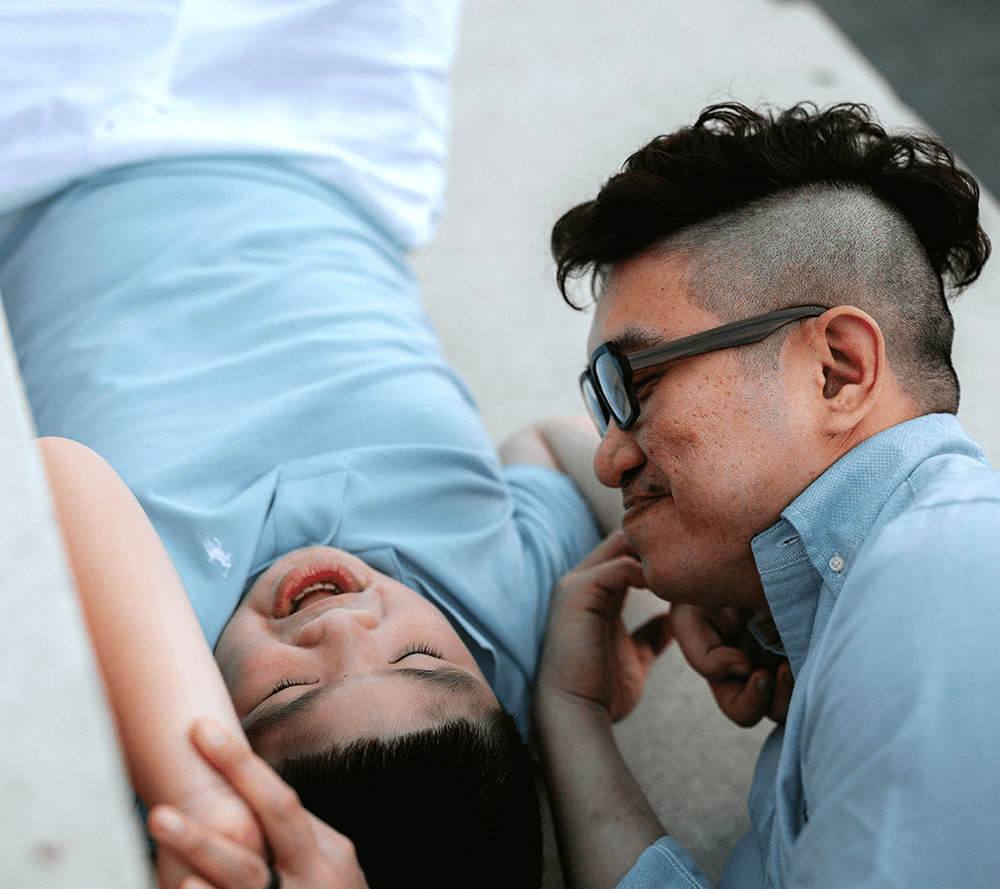
I invite you to consider how you and your church can imitate God’s love for people courageously navigating the waters of displacement this month. We have a critical need for household items. These goods show tangible welcome to people who God has brought to safety on our shores.
Together we can build communities of sacrificial love and welcome!
Grace and peace,
Adrian Hendarta









